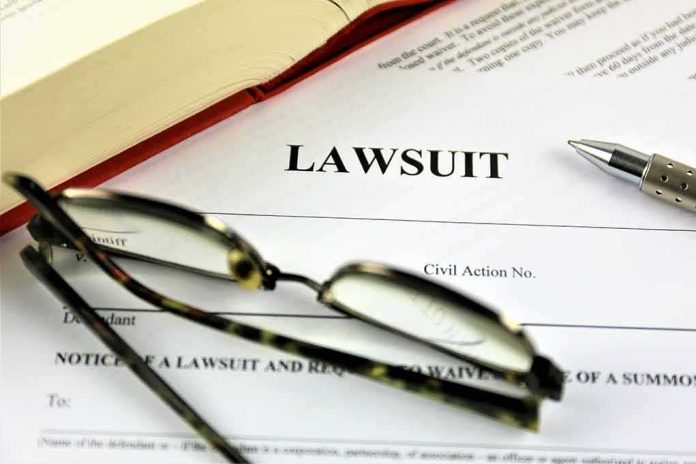
President Trump’s Justice Department has launched a major lawsuit against Los Angeles Mayor Karen Bass and city officials over sanctuary policies that have fueled chaos, violence, and a 500% increase in attacks on federal immigration agents.
Key Takeaways
- The DOJ filed a lawsuit against Los Angeles Mayor Karen Bass, the LA City Council, and the City of Los Angeles over sanctuary city policies that restrict cooperation with federal immigration enforcement.
- Attorney General Pamela Bondi directly linked LA’s sanctuary policies to the recent outbreak of violence, chaos, and attacks on law enforcement in the city.
- The lawsuit claims LA’s policies violate the Constitution’s Supremacy Clause by interfering with federal immigration law enforcement.
- Federal officials reported a 500% increase in attacks on ICE agents during recent protests, including rock-throwing incidents and vehicle fires.
- The Trump administration remains firm that federal immigration laws will be enforced regardless of local opposition.
Federal Government Takes Legal Action Against LA’s Sanctuary Policies
The Trump administration has escalated its battle against “sanctuary” jurisdictions by filing a lawsuit against Los Angeles, directly targeting Mayor Karen Bass and the LA City Council. The Justice Department’s legal action aims to invalidate the city’s ordinance prohibiting the use of local resources for federal immigration enforcement. This move represents a significant confrontation between federal authorities determined to enforce immigration laws and local officials who have established barriers to cooperation with Immigration and Customs Enforcement (ICE).
The lawsuit argues that Los Angeles has created policies that deliberately obstruct federal law enforcement, violating the Constitution’s Supremacy Clause which establishes that federal law takes precedence over conflicting state or local laws. The legal challenge seeks to have the city’s sanctuary ordinance declared unlawful and prevent its continued enforcement, effectively forcing Los Angeles to resume cooperation with federal immigration authorities despite local opposition to President Trump’s immigration enforcement priorities.
Violence and Chaos Linked to Sanctuary Policies
Attorney General Pamela Bondi has directly connected Los Angeles’ sanctuary policies to the recent outbreak of violence and disorder in the city. Federal officials have reported an alarming 500% increase in attacks on immigration officers during enforcement operations, including dangerous incidents where protesters threw rocks at agents and set vehicles on fire. These confrontations have created an increasingly hostile environment for federal law enforcement attempting to carry out their duties.
“Sanctuary policies were the driving cause of the violence, chaos, and attacks on law enforcement that Americans recently witnessed in Los Angeles,” said Attorney General Pamela Bondi.
The Trump administration has documented numerous instances of organized resistance to immigration enforcement in Los Angeles. Protesters have employed disruptive tactics such as clanging pots and pans to interfere with ICE operations. The lawsuit also notes that even the Los Angeles Dodgers organization participated in obstructing federal efforts by denying immigration agents access to their parking facilities. These actions collectively represent what the Justice Department characterizes as systematic interference with legitimate federal law enforcement activities.
Trump Administration Vows Continued Enforcement Despite Opposition
President Trump’s immigration officials have made it clear that federal immigration laws will continue to be enforced in Los Angeles regardless of local resistance. The administration views this lawsuit as fulfilling a campaign promise to restore order and the rule of law in jurisdictions that have adopted sanctuary policies. U.S. Attorney Bill Essayli emphasized that the legal action is about accountability for deliberate obstruction of federal law enforcement, reflecting the administration’s determination to eliminate barriers to immigration enforcement.
“We will keep enforcing federal immigration law in Los Angeles, whether or not the city’s government or residents agree with it. And we will not tolerate any interference with the federal government’s duty to enforce the law,” said Chad Mizelle.
Mayor Karen Bass and California Governor Gavin Newsom have voiced strong opposition to the lawsuit, with Bass declaring, “We will not stand for this.” The Los Angeles Times has reported that city officials are considering a counter-lawsuit against the Trump administration. However, the federal government remains resolute in its position that local jurisdictions cannot legally impede the enforcement of federal immigration law, setting the stage for a protracted legal battle that will likely define the limits of local authority in immigration matters.
Constitutional Questions and Public Safety Concerns
The lawsuit raises fundamental constitutional questions about the relationship between federal and local governments in immigration enforcement. The Justice Department argues that Los Angeles has created a lawless environment by prioritizing illegal immigrants over American citizens, undermining public safety and the rule of law. Attorney General Bondi has been emphatic that such policies are untenable under the Trump administration, reflecting the President’s commitment to strict immigration enforcement as a cornerstone of his domestic policy agenda.
“Jurisdictions like Los Angeles that flout federal law by prioritizing illegal aliens over American citizens are undermining law enforcement at every level – it ends under President Trump,” said Attorney General Pamela Bondi.
U.S. Attorney Bill Essayli reinforced the administration’s position, stating that “Today’s lawsuit holds the City of Los Angeles accountable for deliberately obstructing the enforcement of federal immigration law.” The outcome of this legal confrontation will likely establish important precedents regarding the extent to which local governments can resist federal immigration enforcement and may fundamentally reshape the landscape of immigration policy implementation across the country as President Trump continues his second-term agenda of immigration reform and enforcement.









